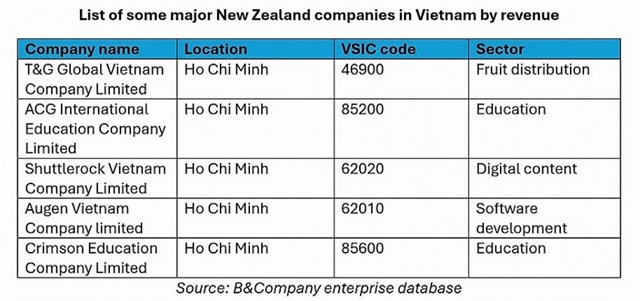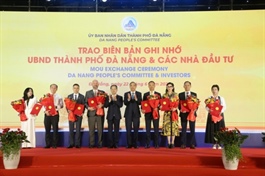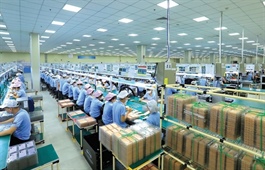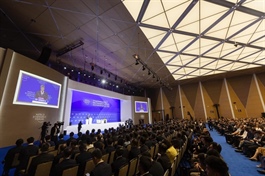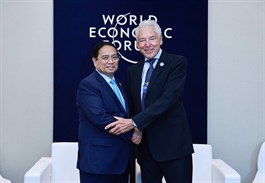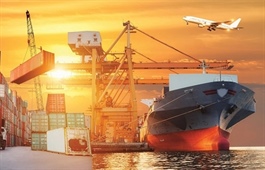Vietnam and New Zealand: from trade partners to FDI allies
Vietnam and New Zealand: from trade partners to FDI allies
Despite contributing only a modest share of Vietnam’s foreign direct investment (FDI) inflows, New Zealand is positioning itself as a strategic partner in Vietnam’s next development chapter. The two nations’ deepening engagement is paving the way for increased capital flows in key areas such as green energy, agri-tech, education and training, and high-value manufacturing.

Nguyen Hoang Viet, Senior research manager B&Company |
Vietnam remains one of the leading investment destinations in Southeast Asia, with strong capital inflows driven by robust economic growth, favourable policies, and strategic supply chain positioning.
Vietnam also continues to play a vital role in attracting FDI in the Southeast Asian region, consistently ranking among the top three countries in terms of inflows over the past five years, behind Singapore and Indonesia.
Foreign-invested enterprises have been playing an increasingly vital role in the country’s economy, contributing around 20 per cent to the national GDP annually. Among these, based on enterprise database of B&Company in 2023, South Korean companies consistently take the lead, accounting for approximately 25 per cent of the total revenue generated by foreign-invested firms, a share that has been steadily increasing, followed by Japan, Singapore, China, and Hong Kong.
However, when looking at average revenue per company, Singaporean firms stand out with the highest figure, reaching around $40 million, compared to about $20 million for South Korea, Japan, China and Hong Kong.
Despite global economic uncertainties, Vietnam is seen as a stable and promising market for global FDI, supported by government initiatives. The country aims to achieve upper-middle-income status by 2035 and net-zero emissions by 2050, with policy priorities focusing on some key aspects such as digital transformation and a transition to a green economy.
Vietnam could face the risk of new tariff measures from the US, which may negatively impact future inflows to Vietnam. However, the prospect for FDI attraction in Vietnam is still bright, as the Vietnamese government is actively engaging in diplomatic negotiations to mitigate such risks and reinforce investor confidence.
With New Zealand, registered FDI remains very modest in both scale and number. The most notable year was 2019, with $134.3 million in registered capital, coinciding with the enforcement of the Comprehensive and Progressive Agreement for Trans-Pacific Partnership in both countries.
In 2024, New Zealand’s registered capital reached nearly $1 million, ranked 63rd among 155 countries, comprising four new projects. Cumulatively, since 1988, New Zealand’s total registered capital stands at $209 million across 55 licensed projects, ranking 39th.
In terms of New Zealand’s investments, projects most concentrated in the fields of real estate, education and training, manufacturing, agro-forestry-fisheries, support services, and construction.
A key highlight in 2024 was PM Christopher Luxon’s announcement of a $3.85 million investment in Vietnam’s horticulture sector, known as VietFruit. The project aims to improve productivity and resilience in passion fruit production, enhance post-harvest processing, and provide sector-wide training for smallholder farmers and businesses.
In terms of active businesses, New Zealand companies operating in Vietnam generated a modest total revenue of approximately $79 million in 2023, averaging around $7 million per company. Most of these businesses are concentrated in Ho Chi Minh City. Notably, around 60 per cent of New Zealand firms in Vietnam operate in the food and beverage sector, while others are present in education, healthcare, technology, textiles, timber, and aviation.
Over the past three years, New Zealand businesses have proactively sought to diversify their partnerships, turning to ASEAN countries such as Vietnam as an alternative to reliance on imports from China.
Bilateral relations between Vietnam and New Zealand have expanded across multiple sectors, underpinned by shared membership in key trade agreements, which provide a strong foundation for enhancing business cooperation between the two nations.
Additionally, during a high-level meeting in February, the prime ministers of both nations agreed to elevate bilateral relations to a comprehensive strategic partnership. Prime Minister Luxon emphasised that Vietnam is one of New Zealand’s top priorities in Southeast Asia. Both sides are committed to diversifying supply chains, aiming to raise two-way trade from the current $1.3 billion to $3 billion in 2026, and to double mutual investment in areas such as modern science and technology, digital transformation, green transition, agriculture, and climate change adaptation.
Aligned with these strategic goals and Vietnam’s active push for digital transformation and green economy, B&Company assesses that there are clear opportunities for New Zealand companies in sectors where they hold competitive advantages. These include high technology, renewable energy, education and training, and premium agriculture.
However, several practical challenges remain. Firstly, the long geographical distance and limited direct flights make travel costly for both business and tourism, highlighting the need to increase direct flight connectivity between the two countries.
Secondly, simplifying administrative procedures and reducing regulatory bottlenecks, and introducing more specific investment incentives for New Zealand businesses under the action plan to implement the comprehensive strategic partnership are essential to enhance investment cooperation.
Thirdly, as most New Zealand companies are small- and medium-sized enterprises that often depend on outsourcing for production and operate under high product standards, Vietnam will need to implement supportive policies aimed at developing a highly skilled workforce. This is essential to ensure local capabilities can meet the technical and quality requirements of high-tech foreign-invested projects from New Zealand and foster long-term business collaboration.
|
- 14:00 26/06/2025


